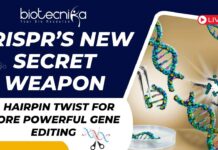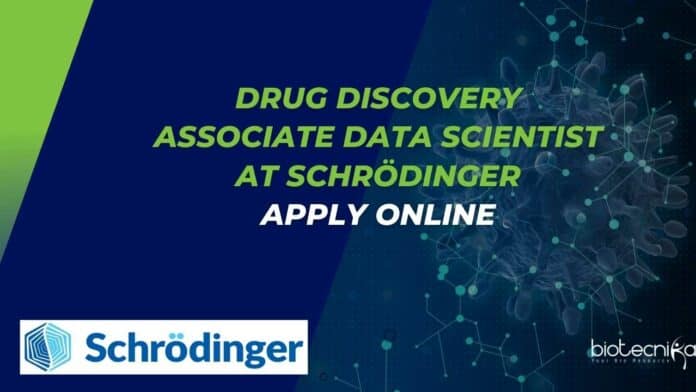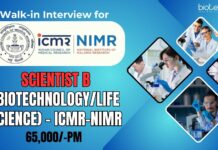Drug Discovery Associate Data Scientist at Schrödinger, Apply Online
Drug Discovery Associate Data Scientist at Schrödinger, Apply Online. MSc Biochemistry jobs. Schrödinger Hyderabad Drug Discovery Data Scientist Jobs. Interested and eligible applicants can check out all of the details on the same below
Possible Interview Questions are posted below
Drug Discovery Associate Data Scientist – Hyderabad
Location: Hyderabad
We’re seeking a Drug Discovery Associate Data Scientist to join us in our mission to improve human health and quality of life!
As a member of our Drug Discovery group, you’ll join a group of about 90 scientists that includes designers, modelers, computational chemists, medicinal chemists, crystallographers, biochemists, and biologists. Our team is also supported by over 100 software developers and engineers. Three of the programs we’ve worked on in the past seven years have progressed into the clinic, and an additional one is expected to enter clinical trials this year. You can see recent news on one of these programs here
.Who will love this job:
- A scientific thinker who has completed at least a year of organic chemistry coursework and has experience with analyzing chemistry journal articles (a background in computational chemistry, cheminformatics, material science, or a related field is a plus)
- An independent worker who understands enzyme inhibition and receptor agonism/antagonism
- A proficient scripter (e.g., shell, Python, R) who’s worked in Linux/UNIX environments
- A motivated learner who’s willing to take on new challenges and accept constructive criticism
What you’ll do:
- Research, curate, and prepare computational chemistry data sets, as well as compile, analyze, and summarize results
- Prepare and maintain drug discovery group chemical database content, which includes:
- processing confidential data and information according to guidelines
- managing data creation, updates, and deletion
- providing quality assurance of imported data by collaborating with key internal or external advisors as necessary
- Exhibit excellent organizational and time management skills, as well as attention to detail
- Participate in improving software and processes via early access usage, bug reporting, and outlining improvement requests
What you should have:
- A Master’s degree in physical science, such as chemistry, biochemistry who has completed at least a year of organic chemistry coursework.
- Experience with any of the following is a plus:
- Scientific Python packages (e.g., pandas, numpy, scipy, matplotlib)
- Version control (e.g., Git)
- Online sources of scientific information (especially NCBI PubMed, RCSB PDB, UniProtKB, EMBL-EBI ChEMBL, SciFinder, Reaxys)
- Databases (e.g., MySQL, sqlite, PostgreSQL);
As an equal opportunity employer, Schrödinger hires outstanding individuals into every position in the company. People who work with us have a high degree of engagement, a commitment to working effectively in teams, and a passion for the company’s mission. We place the highest value on creating a safe environment where our employees can grow and contribute, and refuse to discriminate on the basis of race, color, religious belief, sex, age, disability, national origin, alienage or citizenship status, marital status, partnership status, caregiver status, sexual and reproductive health decisions, gender identity or expression, or sexual orientation. To us, “diversity” isn’t just a buzzword, but an important element of our core principles and key business practices. We believe that diverse companies innovate better and think more creatively than homogenous ones because they take into account a wide range of viewpoints. For us, greater diversity doesn’t mean better headlines or public images – it means increased adaptability and profitability.
Possible Interview Questions:
- Can you explain your experience with analyzing chemistry journal articles and how it relates to drug discovery? Answer: In my previous role, I regularly analyzed chemistry journal articles to stay updated on the latest advancements and trends in the field. This helped me gain insights into new compounds, synthesis methods, and experimental techniques relevant to drug discovery. By understanding the scientific literature, I was able to contribute to the decision-making process and propose innovative approaches to our drug discovery projects.
- How familiar are you with enzyme inhibition and receptor agonism/antagonism? Can you provide examples of how you have applied this knowledge in your previous work? Answer: I have a strong understanding of enzyme inhibition and receptor agonism/antagonism principles. In my previous position, I worked on projects that involved designing compounds targeting specific enzymes and receptors. By applying my knowledge of enzyme kinetics and receptor-ligand interactions, I contributed to the identification of lead compounds with potent inhibitory or agonistic/antagonistic activity. This knowledge allowed me to assess the efficacy and selectivity of potential drug candidates.
- Can you describe your experience working with scientific Python packages and conducting data analysis in a Linux/UNIX environment? Answer: I have extensive experience working with scientific Python packages such as pandas, numpy, scipy, and matplotlib. These tools allowed me to handle and analyze large datasets, perform statistical analysis, and visualize results effectively. Additionally, I am proficient in working in a Linux/UNIX environment, utilizing shell scripting and command-line tools for data processing and automation.
- How have you contributed to the improvement of software and processes in your previous role? Can you provide an example of a situation where you identified a software issue and proposed a solution? Answer: In my previous role, I actively participated in the improvement of software and processes. For instance, I was an early access user of a drug discovery software tool and provided valuable feedback to the development team. I reported software issues and suggested enhancements based on my user experience, contributing to the overall improvement of the software’s functionality and usability. This feedback loop helped ensure that the software met the specific needs of our drug discovery projects.
- Can you discuss your experience working with databases and your familiarity with specific scientific information sources? How have you utilized these resources to support your research and data management? Answer: I have experience working with databases such as MySQL, sqlite, and PostgreSQL for data storage and retrieval. In my previous role, I regularly accessed online scientific information sources such as NCBI PubMed, RCSB PDB, UniProtKB, EMBL-EBI ChEMBL, SciFinder, and Reaxys to gather relevant data for our research projects. By effectively utilizing these resources, I ensured the accuracy and completeness of our data sets, supporting informed decision-making in drug discovery.
Editor’s Note: Drug Discovery Associate Data Scientist at Schrödinger, Apply Online. Please ensure you are subscribed to the Biotecnika Times Newsletter and our YouTube channel to be notified of the latest industry news. Follow us on social media like Twitter, Telegram, Facebook






























